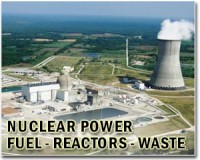 |
Berlin (AFP) Sept 5, 2010 Battered from all sides by environmentalists, lobbyists and bickering ministers, German Chancellor Angela Merkel Sunday hosts a summit on nuclear energy, an issue set to dominate politics in coming months. The crunch get-together at Merkel's office in Berlin will bring together senior politicians to thrash out an emotive issue that will determine future energy policy in Europe's largest economy and one that riles ordinary Germans. The explosive debate centres around what to do with Germany's 17 nuclear reactors that Merkel's predecessor Gerhard Schroeder had decided to mothball by around 2020. Merkel, 56, wants to postpone the shutdown as part of a new "energy concept" for the country due to go before her cabinet on September 28. She calls the extension a "bridge" until renewable sources of energy like wind and solar power can produce more of Germany's power as it seeks to reduce dependence on coal. But the question raging in the country and the government is how long to extend and what price to exact from the energy industry, which would profit enormously from such a move, in exchange. Merkel's coalition has tumbled in recent opinion polls and surveys suggest a majority of Germans oppose the idea of a postponing of the date that the country goes nuclear-free. A large street protest is planned on September 18, an unwelcome development for Merkel who faces six crucial regional elections next year that analysts say could make or break her second term. The chancellor, a former environment minister herself, has hinted that her preference is for an extension of 10-15 years, saying this is what is "technically reasonable." But not everyone in her squabbling coalition agrees. Environment Minister Norbert Roettgen, from Merkel's own conservative Christian Democrats, said last week he wanted to limit the extension to eight years. But Economy Minister Rainer Bruederle, from the pro-business Free Democrats, Merkel's minority coalition partners, contradicted Roettgen, saying he wanted an extension of up to 20 years. A government-commission report last week was meant to bring clarity but with so many variables, not least predicting future electricity and oil prices and demographics, it ended up highly inconclusive. It did however outline how high the stakes are. Without nuclear power, the report said, Germany can forget about its target of reducing CO2 emissions by 80 percent in 2050 from 1990 levels. Environmental pressure group Greenpeace heaped scorn on the report and accused Merkel of yielding to the powerful nuclear energy lobby, a charge echoed by an increasingly confident opposition. "Ten or 15 years extension. That sounds harmless, but it's not," said Tobias Riedl, Greenpeace's nuclear energy expert, on Friday. Another item in the mix is a debate over how to make energy companies such as RWE, Vattenfall and E.ON pay for the extension of their plants and ensure a greater contribution to Germany's energy output from renewable sources. As part of an 80-billion-euro austerity programme for the period 2011 to 2014, Berlin wants to tap energy firms for 2.3 billion euros per year, a quid pro quo for keeping their plants open for longer. But the utility companies are putting all their considerable lobbying powers into resisting such a levy and the nuclear tax was not in the austerity package the cabinet approved Wednesday. Furthermore, Merkel has a tricky legal scenario on her hands, as she needs to ensure any draft law would not be subject to approval in the Bundesrat upper house, where she lost her majority earlier this year.
Share This Article With Planet Earth
Related Links Nuclear Power News - Nuclear Science, Nuclear Technology Powering The World in the 21st Century at Energy-Daily.com
 Iran needs two weeks to fully load fuel in nuclear plant
Iran needs two weeks to fully load fuel in nuclear plantTehran (AFP) Aug 31, 2010 Iran will need two more weeks to complete the process of loading fuel into its Russian-built first nuclear power plant, atomic chief Ali Akbar Salehi said. The process of loading 163 fuel rods, also supplied by Russia, into the nuclear power plant located in the southern port city of Bushehr began on August 21 and was to be completed by September 5. Thereafter the rods were to be transfe ... read more |
|
| The content herein, unless otherwise known to be public domain, are Copyright 1995-2010 - SpaceDaily. AFP and UPI Wire Stories are copyright Agence France-Presse and United Press International. ESA Portal Reports are copyright European Space Agency. All NASA sourced material is public domain. Additional copyrights may apply in whole or part to other bona fide parties. Advertising does not imply endorsement,agreement or approval of any opinions, statements or information provided by SpaceDaily on any Web page published or hosted by SpaceDaily. Privacy Statement |